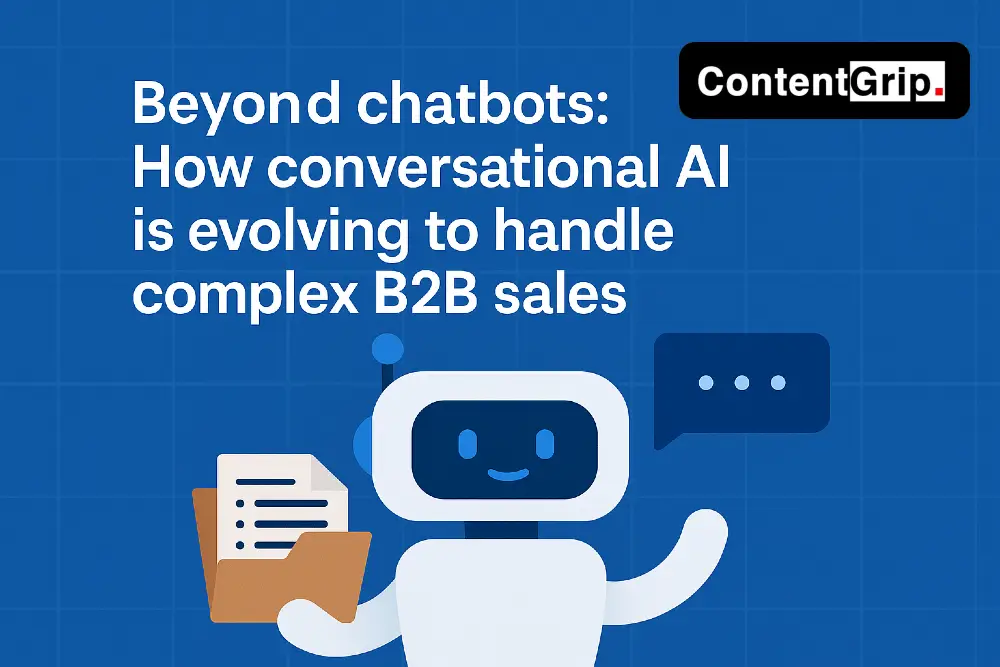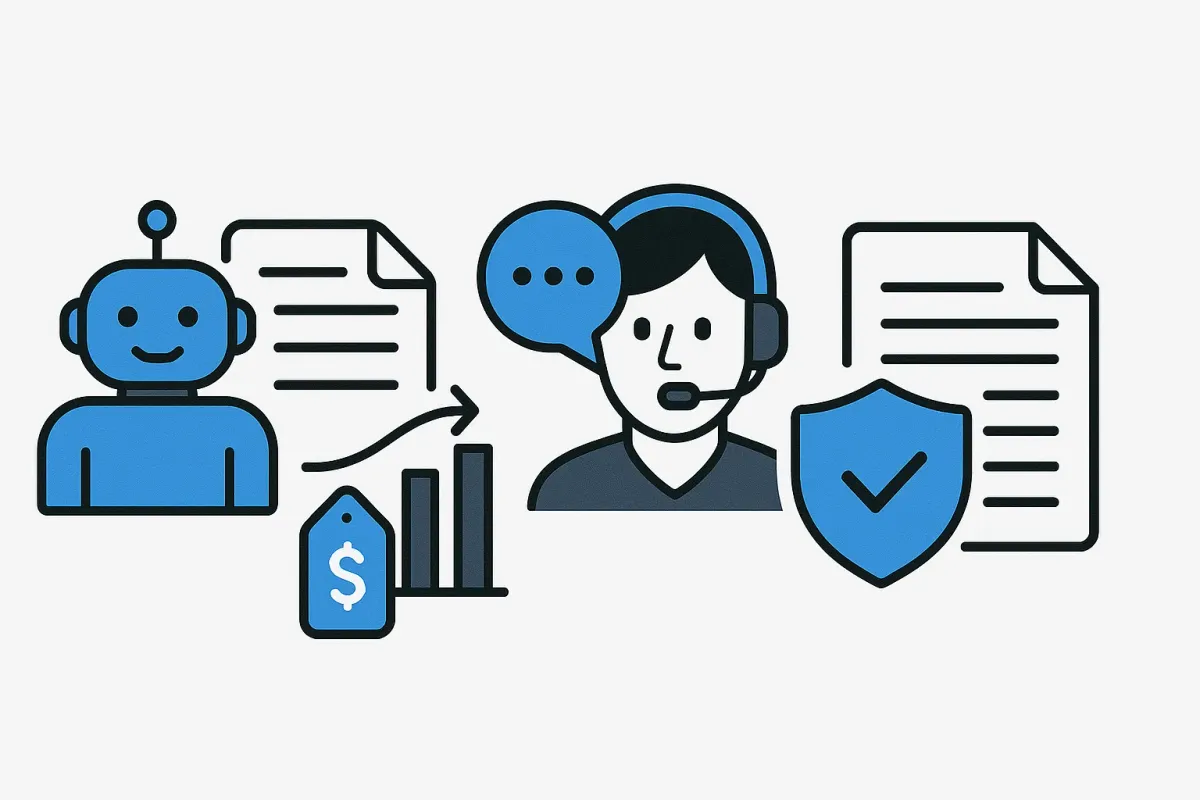Beyond chatbots: How conversational AI is evolving to handle complex B2B sales
AI has evolved beyond basic chatbots, now handling nuanced B2B sales discussions and qualifying enterprise leads with human-like precision.

Conversational AI is experiencing a dramatic evolution in the B2B sales landscape, moving from simplistic chatbots to sophisticated sales assistants capable of handling complex business conversations. This shift is transforming how companies engage with potential clients, with 61.4% of marketers now using AI in some form and 98% planning further adoption[1].
Unlike consumer-focused bots that handle basic questions and simple transactions, today's B2B conversational AI systems can understand nuanced business requirements, negotiate terms, answer technical questions, and effectively qualify enterprise leads – skills previously exclusive to human sales professionals.
From rule-based chatbots to adaptive sales assistants
The first generation of chatbots operated on rigid rule-based programming, following predetermined conversation flows that quickly fell apart when prospects asked unexpected questions. These limited tools could only handle the most basic interactions, leaving sales teams frustrated with their inability to manage real business conversations.
Modern conversational AI solutions have overcome these limitations through several technological advancements:
- Natural Language Processing (NLP) capabilities that understand context, industry terminology, and complex queries
- Machine learning algorithms that improve responses based on thousands of previous sales conversations
- Integration with CRM systems and product databases to access detailed information during conversations
- Ability to detect sentiment and adjust conversation strategies accordingly
Conversational AI technology has evolved dramatically in recent years, moving beyond simple rule-based programming to sophisticated systems that understand context, business problems, and can guide prospects through complex discussions. Drift, a popular conversational marketing platform, introduced 'Bionic Chatbots' in 2023 that leverage generative AI to deliver more accurate conversations while requiring less maintenance from marketing teams[2].

Key capabilities of advanced conversational AI in B2B sales
Today's sophisticated conversational AI systems for B2B sales offer capabilities that were unimaginable just a few years ago:
Technical question handling and product matching
Modern AI can field detailed technical questions about products and services, drawing from extensive knowledge bases to provide accurate information. Companies like Intercom and Ada have developed specialized AI models trained on product documentation, technical specifications, and previous customer interactions.
These systems can understand industry-specific terminology and match prospect requirements to appropriate solutions. For example, when a prospect asks about API integration capabilities or security compliance standards, the AI can provide precise responses without human intervention.
Complex qualification and needs assessment
Beyond simple lead forms, advanced conversational AI can conduct sophisticated qualification conversations that adapt based on prospect responses. These systems ask intelligent follow-up questions to uncover business needs, budget parameters, and decision timelines.
Modern AI solutions can now conduct comprehensive qualification conversations that rival the best sales development representatives. According to research on AI-powered lead qualification, AI-qualified leads convert at higher rates than traditional forms because they gather more contextual information and ensure better fit[3]. These systems can ask intelligent follow-up questions to uncover business needs, budget parameters, and decision timelines with remarkable precision.
According to a recent study, AI-powered lead qualification systems can analyze engagement data like email open rates, website visits, content downloads, and social media interactions to identify when leads are exhibiting signs of buying interest[3]. This ability to detect purchase intent signals allows sales teams to focus their efforts where they'll have the greatest impact.

Objection handling and negotiation
Perhaps most impressively, new generations of conversational AI can address complex objections and even handle preliminary negotiation discussions. Using machine learning trained on thousands of successful sales conversations, these systems recognize objection patterns and deploy effective responses.
When a prospect raises concerns about implementation timelines, competing solutions, or pricing, the AI can acknowledge the concern, provide relevant counter-information, and maintain engagement rather than immediately escalating to a human.
How leading B2B companies are implementing advanced conversational AI
Several forward-thinking B2B companies have already deployed sophisticated conversational AI solutions with impressive results:
Salesforce implemented AI assistants that handle technical pre-sales questions about their extensive product suite. When prospects have specific questions about particular features or integrations, the AI provides accurate responses drawn from their vast product knowledge base. This approach has reduced their sales engineers' involvement in early-stage conversations by 35% while maintaining high customer satisfaction[4].
ServiceNow deployed an advanced AI solution that conducts complete discovery calls with potential enterprise clients. The system explores business challenges, identifies pain points, and recommends appropriate solutions from ServiceNow's portfolio. This approach has doubled their qualified pipeline while reducing SDR workload.
HubSpot uses conversational AI to handle complex qualification discussions across multiple touchpoints. Their system remembers previous conversations, follows up appropriately, and gradually builds a comprehensive understanding of prospect needs that informs their sales approach.
Creatio integrated AI-native assistants into its no-code CRM platform to streamline early-stage sales and service interactions. These AI agents handle routine inquiries, automate data collection, and deliver intelligent recommendations by understanding user context and CRM data natively. This has led to a 61% reduction in lead response time and significantly reduced manual workload—empowering teams to focus on high-value customer engagement while accelerating time-to-value.
Implementation considerations for B2B organizations
While the capabilities of conversational AI have advanced dramatically, successful implementation requires careful planning:
1. Define the right use cases
Not every sales conversation is appropriate for AI handling. Most organizations start with specific use cases where the AI can add immediate value:
- Initial qualification and discovery
- Technical question handling
- Meeting scheduling and coordination
- Follow-up and nurturing conversations
- Objection handling for common concerns
2. Ensure seamless human handoff
Even the most advanced AI systems have limitations. The key to successful implementation is establishing clear triggers for human handoff and ensuring these transitions feel natural to prospects.
"The best implementations don't try to hide that you're talking to an AI," explains David Chan, AI Strategy Consultant at Deloitte. "They're transparent but make the transition to a human representative smooth when the conversation requires that level of expertise."
Leading solutions now detect when conversations exceed AI capabilities and automatically alert human sales representatives with full conversation context.

3. Continuous improvement through feedback loops
Unlike static chatbots, effective conversational AI improves through ongoing feedback loops. Sales teams review AI-handled conversations, identify areas for improvement, and refine the system's responses.
This approach has proven particularly effective in B2B contexts where technical specifications and competitive landscapes evolve rapidly. The most successful implementations incorporate regular retraining cycles based on both successful and unsuccessful conversations.
The human-AI collaboration model emerging in B2B sales
Rather than replacing sales teams, advanced conversational AI is enabling a new collaboration model. AI handles initial engagement, qualification, and basic information sharing, while human sales professionals focus on relationship building, complex solution design, and closing deals.
This hybrid approach is proving more effective than either all-human or all-AI models. According to research from Gartner, B2B organizations using collaborative human-AI sales approaches see 50% higher win rates than those relying exclusively on traditional methods[5].
The most successful organizations view AI not as a replacement for sales professionals but as an amplifier of their capabilities. Sales representatives supported by advanced conversational AI can handle more prospects, provide faster responses, and focus their expertise where it delivers the most value.
The future of conversational AI in B2B sales
Looking ahead, several developments will further enhance the capabilities of conversational AI in B2B sales contexts:
Multimodal understanding: Next-generation systems will process and generate not just text but also visual information, allowing them to discuss product demonstrations, technical diagrams, and visual presentations.
Enhanced personalization: As AI systems gain access to more business intelligence data, they'll deliver increasingly personalized conversations based on company size, industry, existing technology stack, and business challenges.
Emotional intelligence: Advanced systems are beginning to detect and respond appropriately to emotional cues in text and voice conversations, adapting their approach based on prospect engagement and sentiment.
The global conversational AI market was estimated at USD 11.58 billion in 2024 and is expected to reach USD 14.29 billion in 2025, growing at a compound annual growth rate of 23.7% from 2025 to 2030[6]. This rapid growth reflects the increasing recognition of conversational AI's value in business contexts, especially for sales qualification and customer engagement.
The evolution of conversational AI represents a significant opportunity for B2B sales organizations to scale their efforts without sacrificing conversation quality. By strategically implementing these advanced systems, companies can engage more prospects in meaningful discussions while empowering their sales teams to focus on high-value activities that truly require human expertise.
As this technology continues to advance, the line between AI and human sales capabilities will increasingly blur – not because AI is becoming more human, but because it's becoming more effective at handling the complex conversations that drive B2B sales success.
Sources
- Influencer Marketing Hub. (2023). AI Marketing Benchmark. https://influencermarketinghub.com/ai-marketing-benchmark/
- PRNewswire. (October 3, 2023). Drift Defines Future of Conversational Marketing with New AI-Powered Innovations. https://www.prnewswire.com/news-releases/drift-defines-future-of-conversational-marketing-with-new-ai-powered-innovations-301945215.html
- SalesTechStar. (September 25, 2024). AI-Powered Lead Qualification: The Transition from Marketing Qualified Leads (MQLs) to Sales Qualified Leads (SQLs). https://salestechstar.com/staff-writers/ai-powered-lead-qualification-the-transition-from-marketing-qualified-leads-mqls-to-sales-qualified-leads-sqls/
- Salesforce. (2023). State of Marketing. https://www.salesforce.com/resources/research-reports/state-of-marketing/
- Gartner. (2023). MarTech Utilization. https://www.gartner.com/en/marketing/research/martech-utilization-2023
- Grand View Research. (n.d.). Conversational AI Market Size, Share | Industry Report, 2030. https://www.grandviewresearch.com/industry-analysis/conversational-ai-market-report





